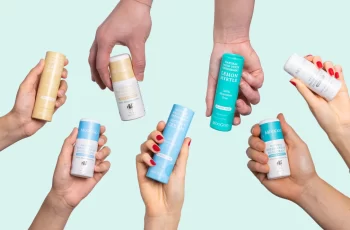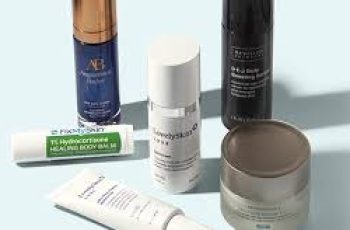
The Science of Ginseng in Skin Care Products
Ginseng is a natural antioxidant powerhouse that has been used in eastern medicine for thousands of years. Revered for its remarkable health benefits when ingested, Ginseng’s abilities make it great for skin care as well as oral supplements. In this blog all about the science of ginseng in skin care, we will unpack the chemistry and uses of this ingredient, and help you determine if ginseng is right for your Baumann Skin Type! If you don’t already know your Baumann Skin Type, you can take the quiz for free by clicking the button below.
What is Ginseng?
Ginseng, derived from the root of plants in the genus Panax, such as Korean ginseng (Panax ginseng) and American ginseng (P. quinquefolius), is a perennial plant somewhat related to wild yams and ginger, whose root has been used for thousands of years in traditional medicine across various cultures. Its rich composition of bioactive compounds, including ginsenosides, polyphenols, and fatty acids, highlights its value in traditional medicine and in skin care formulations.
How is Ginseng used in Skin Care?
The journey of ginseng from root to a cosmetic shelf includes careful extraction process while preserving its components. Typically, the root undergoes cleaning, steaming, and drying, processes. These tactics not only ensure the root’s preservation but may also enhance its bioactive profile, particularly in the case of red ginseng. The finished extract, rich in ginseng’s signature compounds, then becomes a valuable ingredient in serums, creams, and masks.
What is Ginseng made of?
Ginseng is a complex plant packed with diverse bioactive compounds that contribute to its health and skin care benefits. The root of the ginseng plant, in particular, is rich in a variety of phytochemicals, each playing a unique role in promoting health and vitality. Below are some of the most significant specific compounds found in ginseng:
Ginsenosides: These are the most noteworthy active components in ginseng, responsible for much of its therapeutic effects. Ginsenosides are unique saponins that exhibit antioxidant, anti-inflammatory, and anti-aging properties. They’re the focus of much scientific study for their potential to improve skin health, cognitive function, and overall well-being.
Polyphenols : Known for their antioxidant capabilities, polyphenols in ginseng help protect the skin from oxidative stress caused by environmental pollutants and UV radiation. They contribute to the anti-aging effects of ginseng, helping to preserve skin elasticity and reduce the appearance of fine lines and wrinkles.
Fatty Acids : Essential fatty acids found in ginseng, such as linoleic acid and oleic acid, play a crucial role in maintaining the skin’s barrier function, offering moisturizing benefits and supporting skin health.
Phytosterols : These compounds, such as beta-sitosterol, have a structure similar to cholesterol and are known for their skin-soothing and anti-inflammatory properties. Phytosterols in ginseng can help repair skin barrier function and improve skin elasticity.
Polysaccharides: Ginseng polysaccharides have been shown to boost the skin’s hydration, enhance its immune response, and offer anti-inflammatory benefits, making them beneficial in soothing and hydrating skin care formulations.
Vitamins and Minerals : Ginseng is also a source of various vitamins (such as B vitamins and vitamin C) and minerals, which are essential for maintaining healthy skin. These nutrients help in the skin’s healing process, enhance collagen production, and offer protection against environmental damage.
Amino Acids: Serving as building blocks for proteins, amino acids in ginseng contribute to skin healing, barrier health, and moisture retention, aiding in maintaining the skin’s smoothness and hydration.
Benefits of Ginseng in skin care
Ginseng offers a diverse array of benefits to the skin, including antioxidant protection, anti-aging properties, anti-inflammatory properties, and more:
Antioxidant Effects: Ginseng’s antioxidant capacity is pivotal in protecting the skin from free radical damage induced by UV radiation and pollution, thereby mitigating signs of aging.
Collagen Production: Ginseng aids in the promotion of collagen synthesis, providing skin with firmness and elasticity while reducing the appearance of wrinkles and fine lines.
Skin Hydration: By contributing fatty acids to the skin barrier, ginseng helps the skin better retain moisture and stay hydrated.
Inflammation Reduction: Its anti-inflammatory properties help in calming acne breakouts and also interferes with various nerve pathways that trigger inflammation.
UVB Protection: Studies have found that the active compounds in ginseng make it good for preventing damage from UVB radiation.
Additionally, when ingested, ginseng offers systemic health benefits that indirectly reflect on skin health, promoting an overall well-being that radiates through the skin.
Side-effects of Ginseng
While ginseng is generally well-tolerated, its topical application, like any active ingredient, may cause an allergy in some individuals. It is important to understand that ginseng from different parts of the world will have slightly different chemical compositions based on the soil and conditions they were grown in. The perfect ginseng for your skin might be different than the perfect ginseng for someone else. All that being said, organizations like the Environmental Working Group consider ginseng both safe and sustainable as an ingredient in skin care products.
What is Red Ginseng?
Red ginseng, a distinguished type of ginseng, is loved not just for its unique processing method but also for its enhanced properties. The transformation from white to red ginseng involves a steaming process followed by drying, a method that not only increases its shelf life but also augments its bioactive compound profile, particularly ginsenosides, the primary active ingredients in ginseng. This alteration in chemical composition through steaming is believed to improve its medical properties, making red ginseng a highly potent ingredient in both traditional medicine and modern skin care formulations.
Ginseng Serums and other formulations
Ginseng serums use the concentrated essence of ginseng. These products stand out for their potent antioxidant effects. These serums, often combined with other antioxidants and hydrating ingredients, provide a targeted approach to improving skin health. Beyond serums, ginseng is formulated in creams, masks, and even cleansers, each designed to harness its skin-enhancing properties.
Different kinds of Ginseng
The exact function and composition of ginseng can vary significantly depending on its origin, akin to the concept of “terroir” in wine making. Korean ginseng, American ginseng, and Siberian ginseng, among others, each offer unique profiles and benefits, suggesting a nuanced selection for skin care formulations based on desired outcomes.
Is ginseng good for all skin types?
Ginseng is a safe and effective ingredient that can be a good inclusion into the routines of most skin types; however people with particularly oily skin might want to avoid this ingredient.
If your skin is extremely prone to acne, you probably don’t want to add extra oils to your skin, like the ones found in ginseng.
I think this ingredient is best for dry skin types, but an oily skin type could use ginseng if they are also using a good cleanser.
Here are some of my favorite skin care products with ginseng!
Conclusion
Ginseng’s common presence in skin care shows how versatile and potent its benefits are. Whether aiming to combat aging, enhance skin vitality, or provide antioxidant protection, ginseng stands out as a multifaceted ingredient that can cater to a wide range of skin care needs. As we continue to explore the synergy between traditional ingredients and contemporary formulations, ginseng’s role in skin care is both a nod to the past and a step towards a more natural, efficacious approach to skin health.
Remember, identifying your Baumann Skin Type is the most effective way to find out which products are best for your skin. If you still have not taken the quiz, you can do so for free with the button below!


